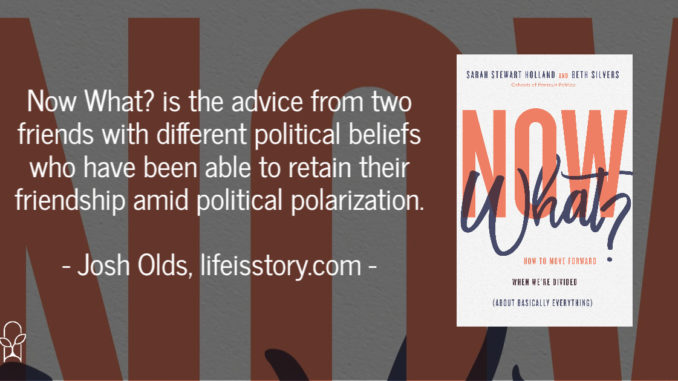
Published by Revell on May 3, 2022
Genres: Non-Fiction, Christian Life, Politics
Buy on Amazon
Goodreads

From friendships to Facebook to far-off countries, what do we do when our lives seem mired in conflict? How do we find connection when our differences are constantly on display and even exacerbated by algorithms and echo chambers? How do we build a kinder society?
If you are tired of the anxiety, frustration, and fear that pervade your connections with other people, both online and in real life, Sarah Stewart Holland and Beth Silvers want you to know one thing--you are not alone. In this book they will help you understand the powerful connections you have with other people on a personal, community-based, national, and even international level. Then they show you how to
- engage your family with a spirit of curiosity- listen closely to the anxieties and fears of your friends- explore shared values within your community- understand your work as a citizen in a diverse country- hold lightly those things that are beyond your control around the world
The status quo isn't working. If you long to be a peacemaker and a positive influence in your spheres, Now What? is your door to a future that is characterized by hope, love, and connection despite our differences.
Sarah and Beth have different political beliefs, but are still friends. And in a very politically polarized age, that’s somewhat incredible. As civically-minded people who have spent their lives engaged in politics and community organizing, Sarah and Beth have had the opportunity to explore their own political thoughts, argue it out with the other, and forge a path forward amid their differences. Now if only the rest of America could do that. Now What?: How to Move Forward When We’re Divided (About Basically Everything) is their blueprint, based on their friendship, for building conversations, friendships, and even political policies with people on the other side of the aisle.
One of the key purposes of this book is to address political differences within families and other close relationships. The first part of the book covers dealing with politics among family, friends, and in the workplace. A lot of it is simply about hearing the person, asking questions, and not catastrophizing the situation. They also acknowledge that some rifts won’t be healed. There won’t be compromise. In some cases, that shouldn’t affect the relationship. In other cases, it might mean having to set certain boundaries.
The most helpful aspects of the book were when it gave alternative ways for individuals to reply to certain political arguments, trying to help people get past the soundbites and media spin and really move into substantive conversations. It also offered opportunities for individuals to consider the perspective of the other side. It does truly provide a model for beneficial, helpful conversation about political differences.
The main problem I have with Now What? is that Sarah Stewart Holland and Beth Silvers are both rational, reasonable people who really aren’t that far from each other on the political spectrum. At one point in the book, they write that they used to introduce their podcast, Pantsuit Politics, with “I’m Sarah from the left” and “I’m Beth from the right” but have seen their views morph as their friendship has grown. From reading the book, I get the sense that Beth grew up Republican then found the party leaving her behind when it embraced Trumpism. Pre-Trump, this might have been a more impactful book because the divide didn’t seem quite so large. The authors are clear that they don’t have a magic formula to overcome rabid partisanship and extremism, a lot of their advice is very helpful, but I can’t help but feel it’ll be left unheeded or not be useful because it can’t bridge a gap that large. Now What? is able to bring together left-leaning moderates with right-leaning moderates…I’m not sure what it can do from election deniers, QANON supporters, and conspiracy theorists whose voices keep dominating the conversation.
In the end, Now What? is about two friends learning to talk about their political differences in a constructive and productive way. They offer a lot of good advice, but their work isn’t prepared to tackle the vitriol, extremism, and lack of listening that populates today’s politics. That’s not their fault. Maybe this book will make a dent. Maybe it’ll move the needle for some people. And maybe that’s all it needs to do. Now What? is a reminder to argue respectfully, discuss coherently, question deeply, and love greatly. It’s a call to move beyond unhelpful political culture war battles and into real and substantive conversations between people who care for each other. I’ll admit that I’m a bit jaded, but it’s worth a shot.
